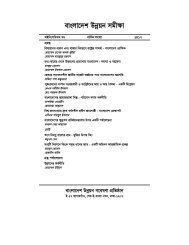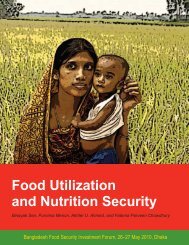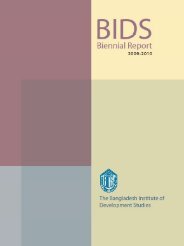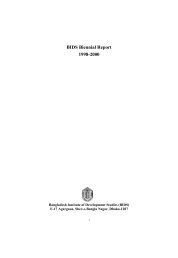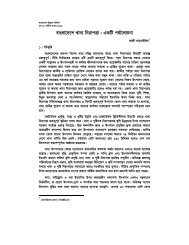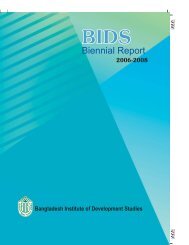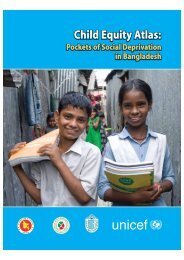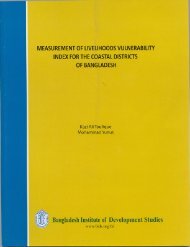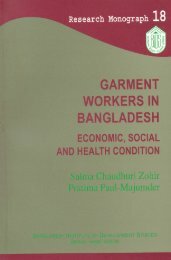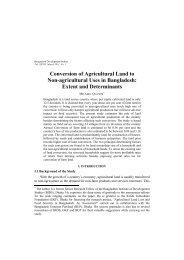INTEGRATED PROTECTED AREA CO-MANAGEMENT (IPAC) - BIDS
INTEGRATED PROTECTED AREA CO-MANAGEMENT (IPAC) - BIDS
INTEGRATED PROTECTED AREA CO-MANAGEMENT (IPAC) - BIDS
Create successful ePaper yourself
Turn your PDF publications into a flip-book with our unique Google optimized e-Paper software.
conservation a very complex job. These need to be taken in perspectives while designing comanagement.<br />
While more than two-fifths of the population are in extreme poverty (Chapter 2),<br />
of all the issues, then the poverty situation needs to be tackled first for the success of comanagement.<br />
Role of local institutions<br />
The local government institutions (LGIs) such as Union Parishad and Upazila Parishad need to<br />
be strengthened as their role is very crucial in both protecting the forest and improving the<br />
situation of the collectors. The SRF actors are in the opinion that politicization and lack of<br />
integrity of these institutions are the major bottlenecks to managing and conserving the forest.<br />
Without strong participation of the LGIs the conservation of the SRF through co-management<br />
may not be successful and sustainable. Strong policies are also necessary for the UPs to function<br />
independently apart from enhancing their capacities.<br />
Ownership of the local people<br />
Sense of ownership has to be promoted so that people are engaged in conservation. It is<br />
important that the conservation project is a participatory one in its approach. It is important to<br />
make it clear to people that the project is meant for the community; and their stake into the<br />
project is ensured with the policy framework.<br />
Natural hazards<br />
The extreme poverty situation is further deteriorated by the incidence of natural calamities. The<br />
destruction by natural calamities inevitably makes the poor hungry, only to make them angry<br />
and get involved in indiscriminate extraction from the SRF, often illegally. So, addressing the<br />
issue of destruction due to natural calamities should also be integrated with forest co-management.<br />
Alternative livelihood means for fish fry collectors<br />
It is important to provide allowance or alternative livelihood means (e.g., interest-free microcredit<br />
provision, skill development training) for those engaged in collecting fish fries to reduce<br />
dependency on fishing. A provision of special allowance for education of children involved in<br />
shrimp fry collection would also be helpful. Issuing permits and licenses to fry catcher would<br />
allow only the seasonal capture of fry.<br />
Social Forestry Issues<br />
Social forestry is a good option in the context of forest conservation. The beneficiaries of the<br />
social forestry programs should include only those who took part in plantation and nurture from<br />
the time of commencement. But the reported politicization at times in changing the list of the<br />
beneficiaries at the time when income is generated is a concern posed by FGD participants. Such<br />
activities will simply dismantle the effort of conservation through social forestry programs. This<br />
gives a message that co-management of SRF would also be jeopardized if potential political<br />
interference is not taken care of.<br />
Insurance for the SRF resource collectors<br />
The collectors take high financial and life risks during collection of products from the forest as<br />
the act of pirates (demanding high ransom) and tigers has been cited by a large number (30%) of<br />
167



